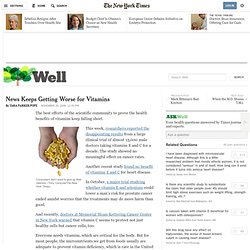

News Keeps Getting Worse for Vitamins. The best efforts of the scientific community to prove the health benefits of vitamins keep falling short.

Consumers don’t want to give up their vitamins. (Tony Cenicola/The New York Times) This week, researchers reported the disappointing results from a large clinical trial of almost 15,000 male doctors taking vitamins E and C for a decade. The study showed no meaningful effect on cancer rates. Another recent study found no benefit of vitamins E and C for heart disease. In October, a major trial studying whether vitamin E and selenium could lower a man’s risk for prostate cancer ended amidst worries that the treatments may do more harm than good. A bad week for the nutritional supplements industry. Time to kick the multivitamin habit, studies suggest - Health - Diet and nutrition. If you're like many Prevention readers, multivitamins have been a key part of your daily routine since... well, forever.

As recently as 2002, no less an authority than the Journal of the American Medical Association recommended that "all adults take one multivitamin daily. " We at Prevention have suggested them to you dozens of times over the years as well. And many doctors and nutritionists still urge a multivitamin to any "less-than-perfect eater" to compensate for dietary shortfalls. But today, a tsunami of scientific data has resulted in a reversal in thinking among many experts in the health and nutrition community, including Miriam Nelson, PhD, director of the John Hancock Research Center on Physical Activity, Nutrition, and Obesity at Tufts University. "The multivitamin as insurance policy is an old wives' tale, and we need to debunk it," she says.
Prevention 20 Celebrity Icons of Breast Cancer Hide Dark Circles Around Your Eyes. Vitamins 'undo exercise efforts' Taking vitamins after exercise may undo some of the beneficial effects of the workout, research suggests.

Some advocate taking antioxidants like vitamin C and E to help protect the body from harmful chemical by-products it creates in breaking into a sweat. But German scientists now believe these "free radicals" may actually be good for us and even buffer against diabetes, PNAS reports. And mopping them up with antioxidants may do more harm than good. It is thought that antioxidant vitamins may be able to prevent damage to the body's tissues called "oxidative stress" by eliminating the free radicals which are said to cause it.
This damage has been implicated in several major diseases including cancer and heart disease as well as normal ageing. But Dr Michael Ristow, of the University of Jena, and his team have shown free radicals may have a positive effect on the body by increasing its sensitivity to insulin - something that is lost in type 2 diabetes. Too much of a good thing.